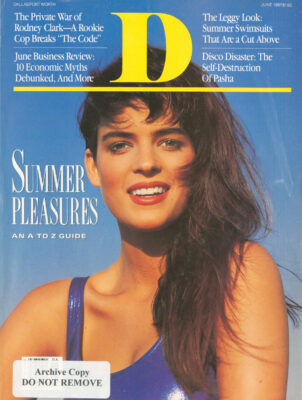The next time you belly up to the supermarket checkout, your cart laden with cans of noodle soup, tins of coffee, and trays of chicken, you have a 50 percent chance of being robbed. But don’t look for a guy in a stocking mask. The stick-up artist is your grocery store’s cash register.
I know. I’ve been following the bandit’s trail tor six months. I’ve watched as he squeezed extra quarters from jars of apple juice. I’ve seethed as he skimmed dollars from milk. I’ve filmed as he filched dimes from TV dinners and greased his palms with pennies from pounds of butter.
It all began last July with a bag of dog food and a moment of truth at the Safeway. According to the store ad and shelf card, the twenty-five-pound bag of Purina Dog Chow was on sale for $6.99. But when the clerk punched in the product code, the cash register spat out the regular price: $9.99.
It was then I decided to keep tabs on the tabs grocers ring up. Thirty-six shopping trips and $1,587.26 worth of groceries later, the results of my informal consumer poll are in. In exactly half of my visits, the cash register cheated me. The heftiest error weighed in at $8.19, the least at four cents. The chain fouling up most often was Minyard, soaking me for extra change on all five visits. Winn-Dixie fared best, the only chain with a perfect score.
But before food chain chieftains start poking holes in this survey, let me stress its scientific shortcomings. This is not your Gallup Grocery Poll. I didn’t always shop on the same day of the week or at the same hour of the day. I patronized some chains seven or eight times, others only four or five. (Of | course, it’s doubtful that the average shopper is any more bound to routine than I am.) I did, however, make certain attempts to be fair and democratic. Crosstown forays took me to stores in Oak Cliff, Garland, East Dallas, Casa Linda, North Dallas, University Park, Lake-wood, and Oak Lawn.
The survey matched wits with cash registers for six chains: Kroger, Minyard, Skaggs Alpha Beta, Tom Thumb, Winn-Dixie, and the now-locally-defunct Safeway. Nine times, I hit stores with manual registers. The other twenty-seven times, I entrusted my groceries to scanners. I didn’t count beer runs or late-night sprints for ice cream. Only major shopping expeditions, with receipts totaling more than $20, made the cut. And I didn’t include errors that clerks caught themselves.
Check-out mistakes for all chains totaled S26.03, or 1.6 percent of the grocery bill for the thirty-six visits, with Minyard leading the loss column. After Minyard, chains with the worst error rate were Kroger (stiffing me on more than three-fourths of my trips), Tom Thumb (derelict on three out of five visits), and Skagg’s (with an even win-loss record). Safeway rivaled Winn-Dixie with a near-perfect performance.
Kroger committed the costliest blooper. At its North Henderson store, I shelled out $8.97 for two dozen eggs advertised at 39 cents a carton. As the clerk blithely went on to ring up Do-ritos and coffee, I pointed out that for the price of those eggs, I should be able to make omelettes for the multitudes.
The most annoying mistake occurred at Tom Thumb on Gas-ton Avenue, where twice in two weeks, the scanner spat out $8.45 for dog food advertised both weeks at $7.67.
Reasons for errors ranged from butterfingered clerks to mismarked products. But far and away the most common excuse for pricing faux pas was a store computer that didn’t know an item was on sale. Time and again, 1 brandished the store’s own ads to disbelieving clerks. At a Minyard on Garland Road, which charged $1.69 for bologna advertised at 98 cents, the clerk peered at the ad and shrugged: ’Sometimes the sales don’t get put into the scanner.”
And when they don’t, busy Dallasites without time or patience to memorize prices or fumble through store fliers wind up paying. The $26.03 I was overcharged in six months of supermarket roulette may not sound like much, but if every family in Dallas spent as much extra for groceries as I did, the number becomes significant. In a typical Safeway, for example, total 1985 sales were about $7.5 million. If 1.6 percent of those sales came from cash register rip-offs, that would amount to $120,000 a year per store.
Do errors work the other way? Do they enrich customers as often as they rob them? I can’t swear that a mistake in my favor didn’t slip by, but I didn’t catch one. Nor am I sure that I spotted every boner that cost me money.
Chances are, most Dallas shoppers never even check the checker. “I’ve never caught a mistake,” says Deep Ellum resident Deborah Anderson. “I never think about it. With the computer age, you know, I just totally trust the machine. Who am I to qustion it? It’s God’s way.”
Get our weekly recap
Brings new meaning to the phrase Sunday Funday. No spam, ever.
Related Articles

Arts & Entertainment
DIFF Documentary City of Hate Reframes JFK’s Assassination Alongside Modern Dallas
Documentarian Quin Mathews revisited the topic in the wake of a number of tragedies that shared North Texas as their center.
By Austin Zook

Business
How Plug and Play in Frisco and McKinney Is Connecting DFW to a Global Innovation Circuit
The global innovation platform headquartered in Silicon Valley has launched accelerator programs in North Texas focused on sports tech, fintech and AI.

Arts & Entertainment
‘The Trouble is You Think You Have Time’: Paul Levatino on Bastards of Soul
A Q&A with the music-industry veteran and first-time feature director about his new documentary and the loss of a friend.
By Zac Crain


